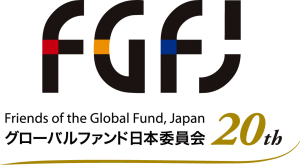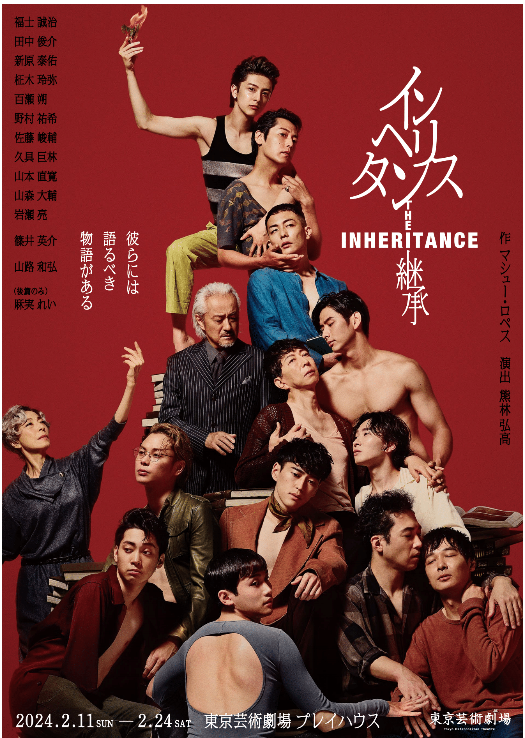2023 marks 40 years since the discovery of HIV, the virus that causes AIDS. Over the last four decades, AIDS has spread throughout the world and remains a pandemic to this day.
Friends of the Global Fund, Japan (FGFJ) is collaborating with a public theatre in Tokyo to put on a Japanese production of the Broadway award-winning play, “The Inheritance,” which tells the story of three generations of gay people and their day-to-day joys, love, and struggles with HIV/AIDS and discrimination.
To commemorate this play’s production in Japan, FGFJ held a public seminar in Tokyo, Japan ahead of World AIDS Day on November 30, 2023. The seminar brought together the leading actor of the play and a mixture of Japanese and overseas HIV experts and representatives of the HIV community to shed light on HIV, gender, and LGBTQ+ issues and also raise awareness about Japan’s engagement with the Global Fund.
Event Report:
Opening Session
The event began with remarks from FGFJ Diet Task Force Co-Chair, Hon. Ichiro Aisawa, and Mr. Toshihiro Kitamura from the Ministry of Foreign Affairs, underscoring the enduring challenge and response to the HIV/AIDS pandemic. Mr. Aisawa emphasized the critical risks women face and the importance of uniting in the battle against HIV/AIDS and future pandemics. Mr. Kitamura, who is currently representing Japan as a Board Member for the Global Fund to Fight AIDS, Tuberculosis and Malaria (the Global Fund), acknowledged that persistent stigma and discrimination have a greater impact on lower-middle-income countries, especially among women and children.
Session #1
 During the first session, the panel discussed the Japanese production of “The Inheritance,” a play set in New York that portrays three generations of gay men and their struggle with HIV/AIDS. Seiji Fukushi, who plays the lead role in the play, shared his perspective on the six-and-a-half-hour play’s exploration of love and the salon-type gatherings his character hosts, drawing a contrast to the play “Rent” and the evolution of HIV/AIDS treatment. Mr. Yuzuru Ikushima provided insights into the HIV/AIDS landscape in Japan, noting the challenges faced by the MSM community, the progress in treatment enabling an almost undetectable presence of the virus, and the exacerbated difficulties during the COVID-19 pandemic. The dialogue touched upon the transformative power of theater in fostering empathy and addressing societal prejudices, with Mr. Fukushi likening the social halt caused by the COVID-19 pandemic to the early days of the AIDS crisis and stressing the importance of communication in overcoming bias. The session concluded with a call to inherit the lessons learned from HIV/AIDS and to aspire toward a more accepting society.
During the first session, the panel discussed the Japanese production of “The Inheritance,” a play set in New York that portrays three generations of gay men and their struggle with HIV/AIDS. Seiji Fukushi, who plays the lead role in the play, shared his perspective on the six-and-a-half-hour play’s exploration of love and the salon-type gatherings his character hosts, drawing a contrast to the play “Rent” and the evolution of HIV/AIDS treatment. Mr. Yuzuru Ikushima provided insights into the HIV/AIDS landscape in Japan, noting the challenges faced by the MSM community, the progress in treatment enabling an almost undetectable presence of the virus, and the exacerbated difficulties during the COVID-19 pandemic. The dialogue touched upon the transformative power of theater in fostering empathy and addressing societal prejudices, with Mr. Fukushi likening the social halt caused by the COVID-19 pandemic to the early days of the AIDS crisis and stressing the importance of communication in overcoming bias. The session concluded with a call to inherit the lessons learned from HIV/AIDS and to aspire toward a more accepting society.
Session #2
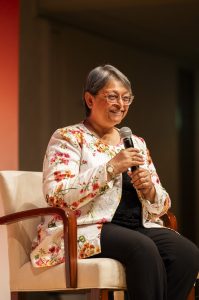 In the second session, Motoko Seko and Quarraisha Abdool Karim highlighted the enduring struggle with HIV/AIDS in Africa and acknowledged Japan’s vital support through the Global Fund. Dr. Karim pointed to PreP as a revolutionary step in HIV prevention, despite the concerning rates of infection among young women in sub-Saharan Africa. Reflecting on the gender disparities in infection revealed by epidemiological studies, she emphasized the need for women-initiated preventive technologies and the importance of community engagement to bridge the knowledge gap. The discussion also addressed the challenges in treatment efficacy for women due to biological factors, stressing the importance of inclusive biomedical interventions and societal change towards gender equity. Concluding the session, Dr. Abdool Karim expressed gratitude for the global solidarity epitomized by Japanese contributions to the Global Fund, reinforcing the idea that shared responsibility is key in the global health landscape.
In the second session, Motoko Seko and Quarraisha Abdool Karim highlighted the enduring struggle with HIV/AIDS in Africa and acknowledged Japan’s vital support through the Global Fund. Dr. Karim pointed to PreP as a revolutionary step in HIV prevention, despite the concerning rates of infection among young women in sub-Saharan Africa. Reflecting on the gender disparities in infection revealed by epidemiological studies, she emphasized the need for women-initiated preventive technologies and the importance of community engagement to bridge the knowledge gap. The discussion also addressed the challenges in treatment efficacy for women due to biological factors, stressing the importance of inclusive biomedical interventions and societal change towards gender equity. Concluding the session, Dr. Abdool Karim expressed gratitude for the global solidarity epitomized by Japanese contributions to the Global Fund, reinforcing the idea that shared responsibility is key in the global health landscape.
Session #3
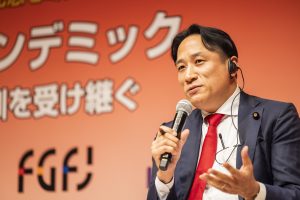 In the third session, MC Haruka Sakamoto led a discussion featuring four panelists who tackled the complex landscape of HIV/AIDS and a video message from Ms. Maurine Murenga. Mr. Ryuhei Kawada recounted his personal battle with HIV, highlighting the transformative power of legal action and treatment in Japan and the need for creating supportive social frameworks. Mr. Jun Sugihara spoke of the necessity for combining domestic policies with international aid, while the Global Fund’s Dianne Stewart shared her experiences from the early days of the epidemic in South Africa, stressing the need to educate youth and address the persistent stigma around HIV. Mr. Charles Gore shared the successes of the Medicines Patent Pool in reducing medication costs and the importance of small contributions to significant changes.
In the third session, MC Haruka Sakamoto led a discussion featuring four panelists who tackled the complex landscape of HIV/AIDS and a video message from Ms. Maurine Murenga. Mr. Ryuhei Kawada recounted his personal battle with HIV, highlighting the transformative power of legal action and treatment in Japan and the need for creating supportive social frameworks. Mr. Jun Sugihara spoke of the necessity for combining domestic policies with international aid, while the Global Fund’s Dianne Stewart shared her experiences from the early days of the epidemic in South Africa, stressing the need to educate youth and address the persistent stigma around HIV. Mr. Charles Gore shared the successes of the Medicines Patent Pool in reducing medication costs and the importance of small contributions to significant changes.
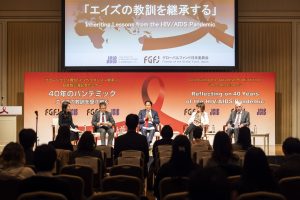
The session touched on Japan’s continuous support of the Global Fund, emphasizing its contributions to global health and the need for continued solidarity and support. The panelists agreed on the urgency of addressing the challenges posed by crises, with the Global Fund ensuring the provision of HIV treatment against all odds. The discussion concluded by recognizing the power of community leadership, the significance of patient-centered policymaking, and global cooperation in the ongoing fight against HIV/AIDS.
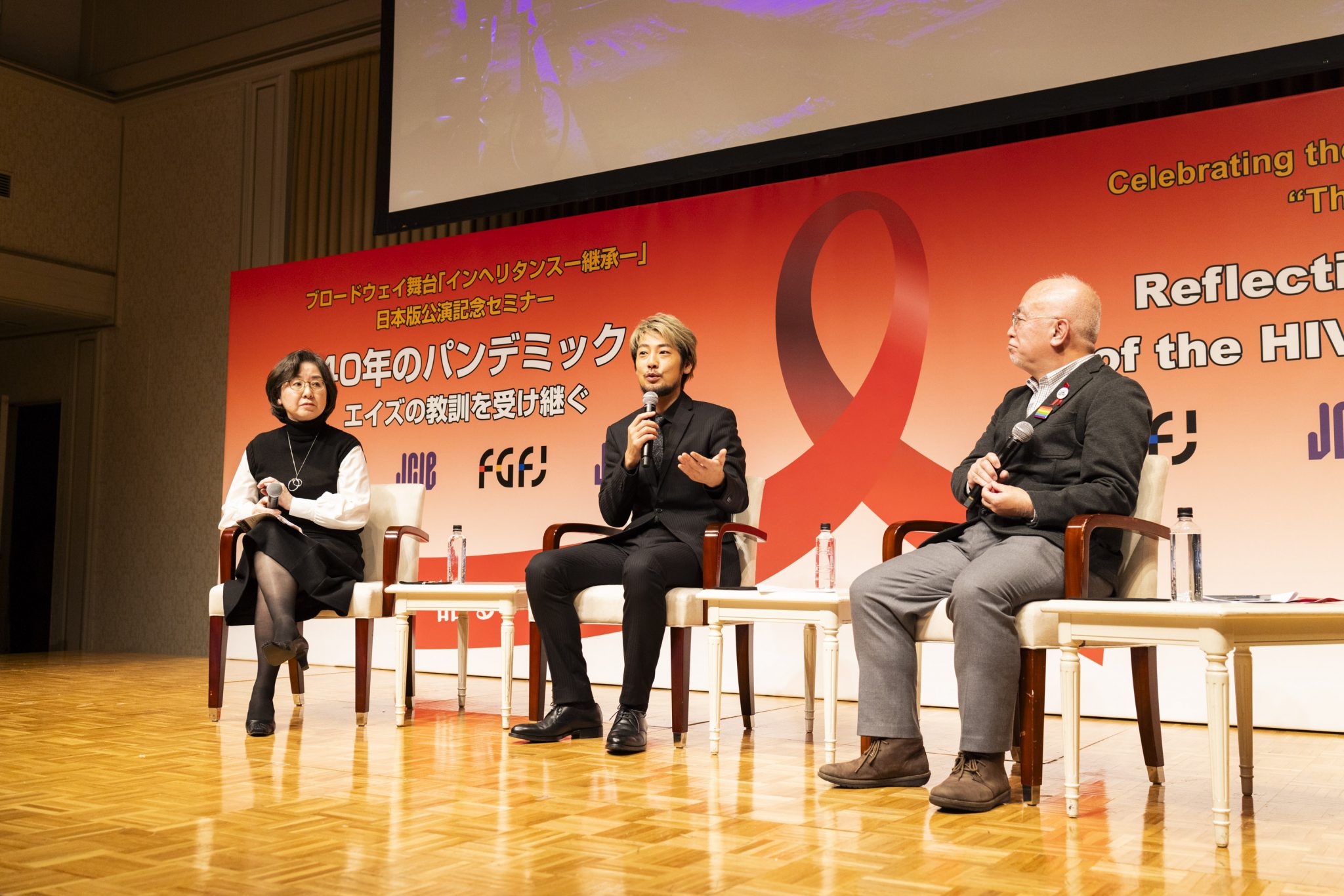
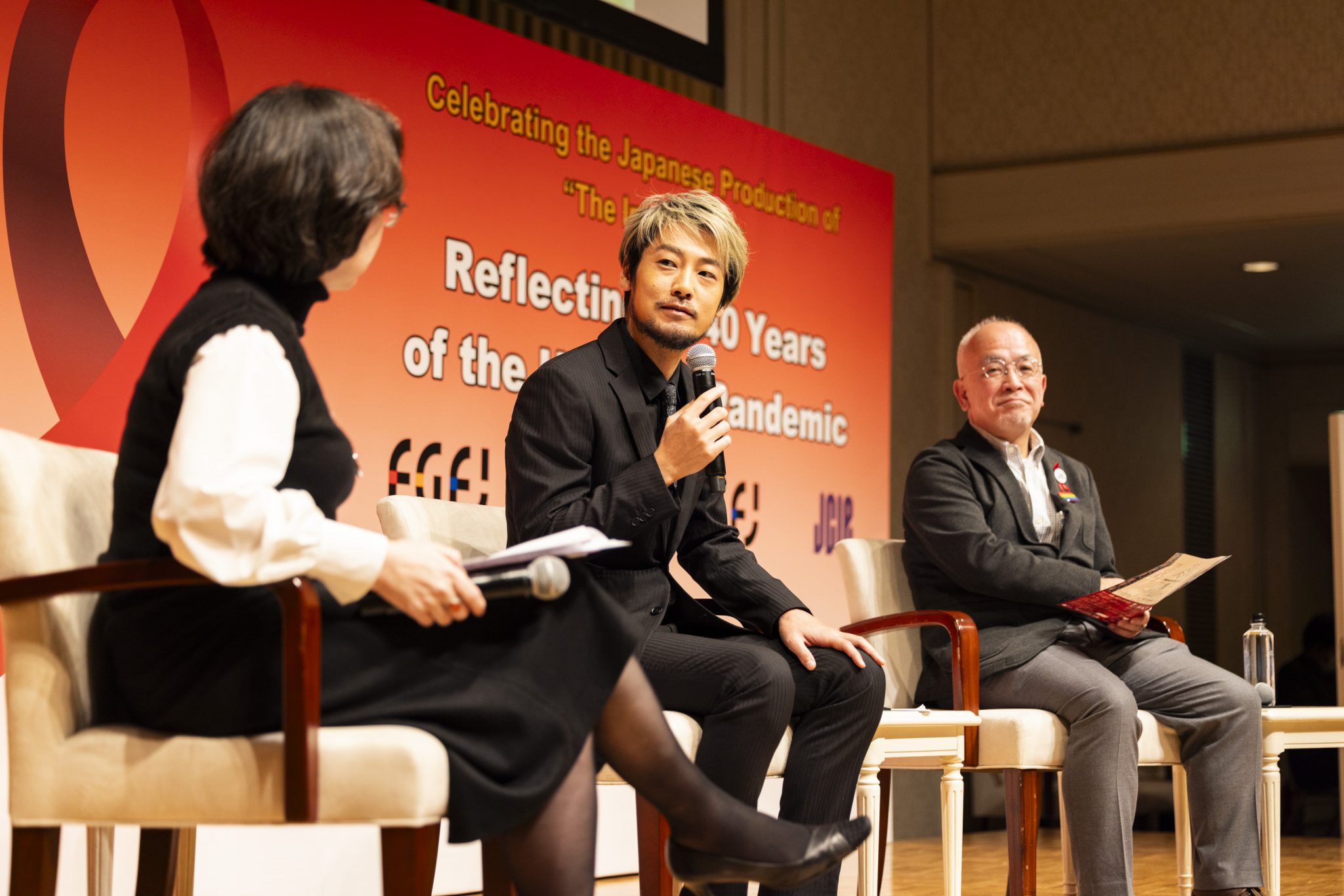
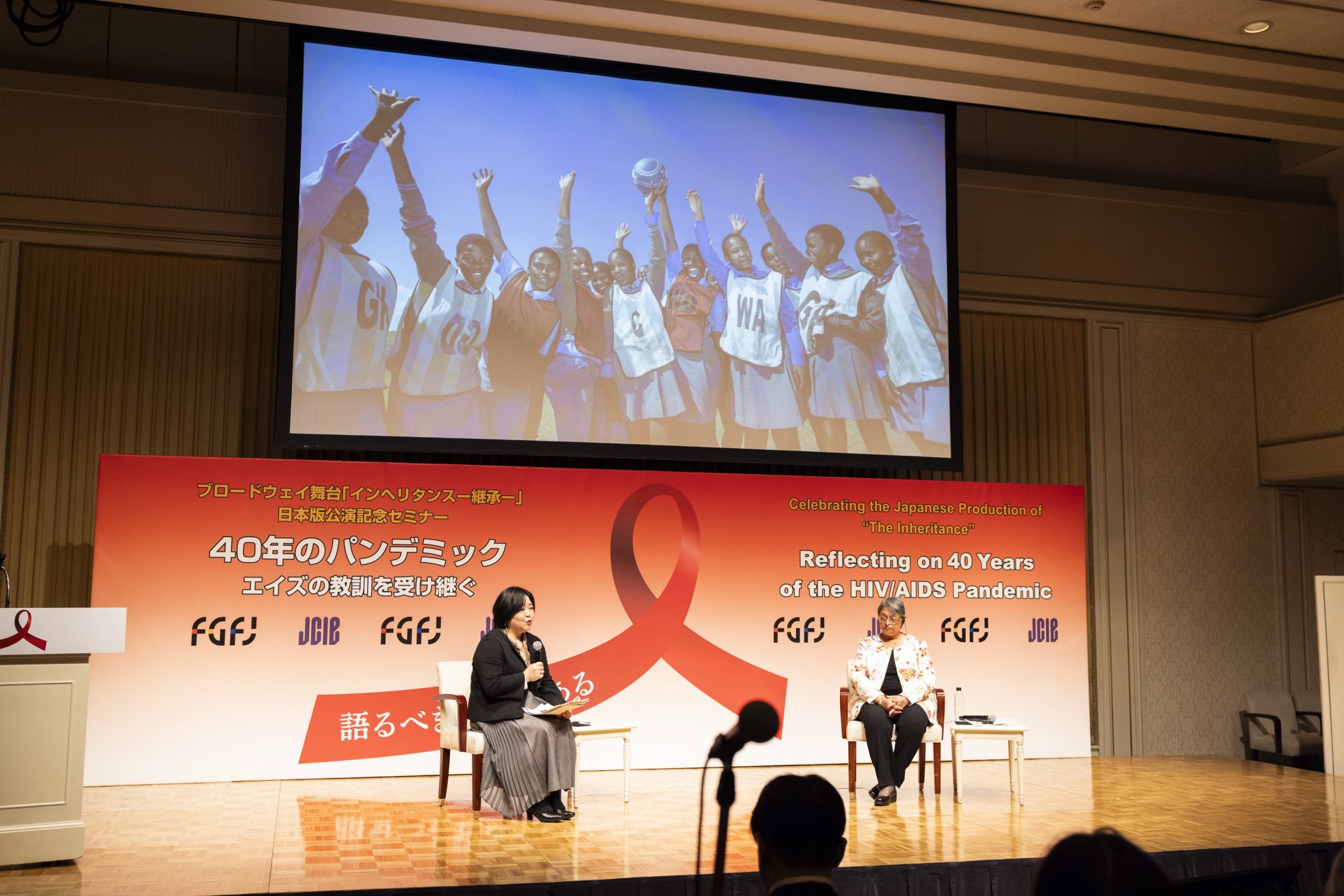
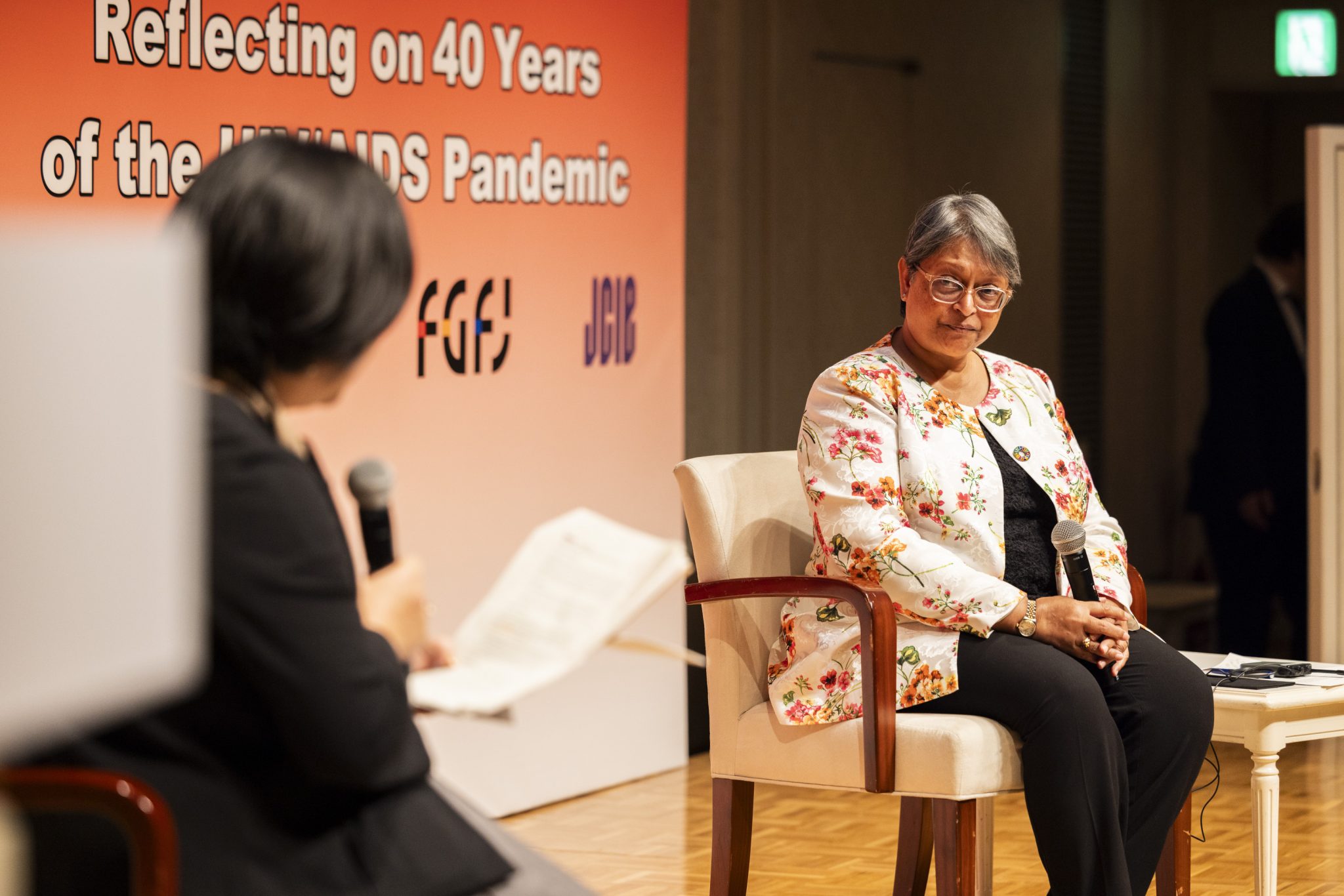
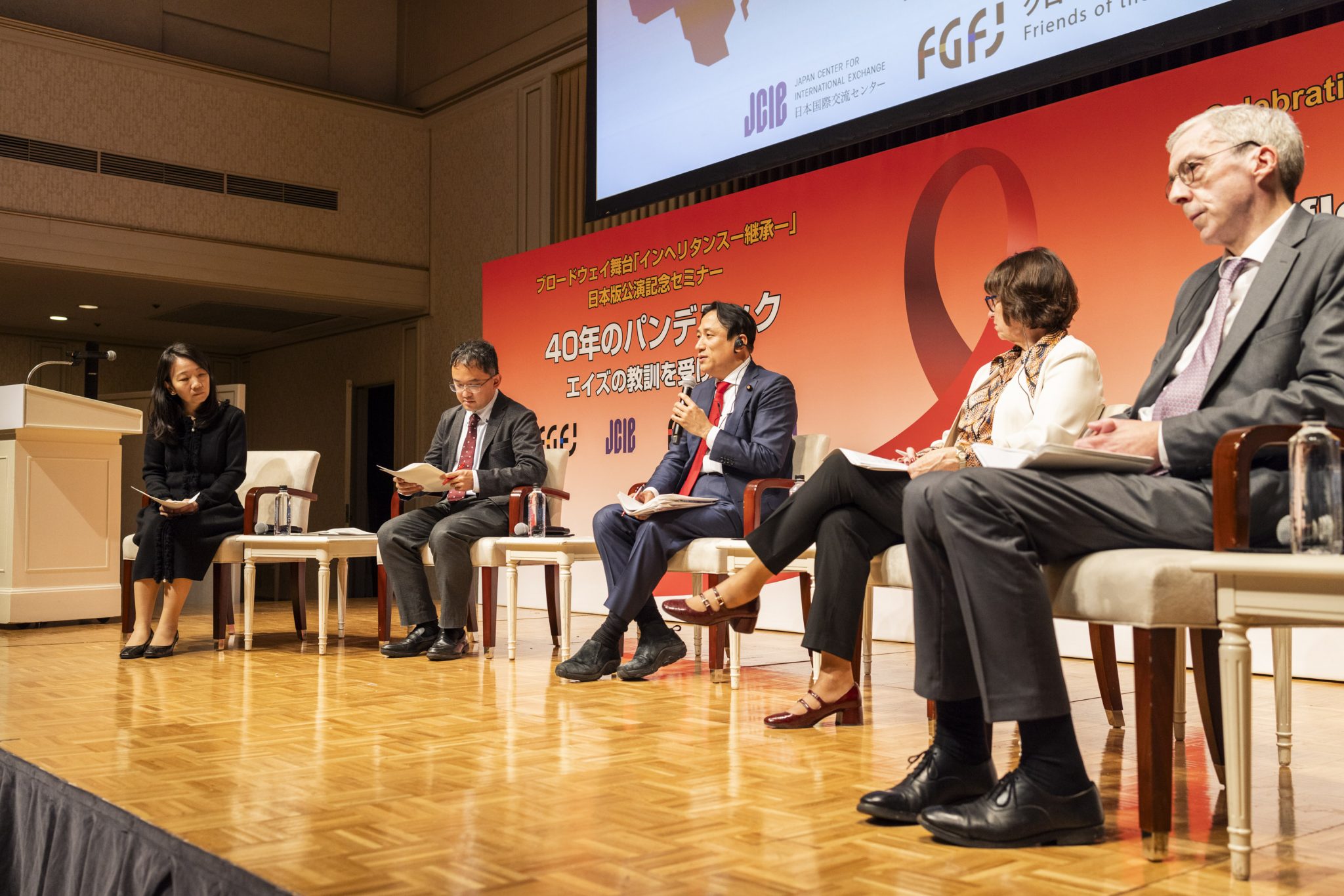
Event Program & Speaker Information:
- Sayoko Mita, Freelance Announcer [Moderator]
- Ichiro Aisawa, Member, House of Representatives; Co-Chair of the FGFJ Diet Task Force [Welcome Remarks]
- Toshihiro Kitamura, Deputy Director-General for Global Issues, International Cooperation Bureau, Ministry of Foreign Affairs [Greetings from Guest of Honor]
*To watch this full session (in Japanese only): Opening Session on YouTube
40 Years of HIV/AIDS: Three Generations of Lessons Inherited
This session covered HIV/AIDS and LGBTQ+ issues in Japan and other regions of Asia.
- Seiji Fukushi, Actor, “The Inheritance”
- Yuzuru Ikushima, Executive Director, NPO PLACE Tokyo
- Satoko Itoh, Managing Director, Japan Center for International Exchange (JCIE); Assistant Director, Friends of the Global Fund, Japan (FGFJ)
*To watch this full session (in Japanese only): Session #1 on YouTube
Special Session: HIV/AIDS and Gender in Africa
This session covered issues of HIV/AIDS and vulnerable populations, particularly focusing on the status and challenges of HIV prevention in adolescent girls and young women in Africa.
- Quarraisha Abdool Karim, co-Founder and Associate Scientific Director of Center for the AIDS Programme of Research in South Africa (CAPRISA); Laureate of the 4th Hideyo Noguchi Africa Prize for Medical Research Category
- Motoko Seko, Associate Professor, Eikei University of Hiroshima; Member, Global Fund Technical Review Panel (Human Rights and Gender)
*To watch this full session: Session #2 on YouTube
Panel Discussion: Inheriting Lessons from the HIV/AIDS Pandemics
This panel consists of CSO representatives, the Japanese government, and international organizations who have been engaged in the global fight against HIV/AIDS. The panelists reviewed the lessons learned over the years, discussed what is needed to end HIV/AIDS and prevent another pandemic from occurring, and considered what each of us can do to contribute.
- Haruka Sakamoto, Associate Professor [Moderator]
- Ryuhei Kawada, Member, House of Councillors
- Jun Sugihara, Director, Office of Ending AIDS Epidemic; Director, Office of Tuberculosis Elimination; Principal Deputy Director, Division of Infectious Disease Prevention and Control, Department of Infectious Disease Prevention and Control, Public Health Bureau; Ministry of Health, Labour and Welfare
- Dianne Stewart, Head, Donor Relations Department, External Relations Division, The Global Fund to Fight AIDS, Tuberculosis and Malaria
- Charles Gore, Executive Director, Medicines Patent Pool (MPP)
- Maurine Murenga, Founder and Executive Director, Lean on Me Foundation, Kenya
- Commentary from Quarraisha Abdool Karim, co-Founder and Associate Scientific Director of Center for the AIDS Programme of Research in South Africa (CAPRISA); Laureate of the 4th Hideyo Noguchi Africa Prize for Medical Research Category
*To watch this full session (partially in Japanese only): Session #3 on YouTube
OPENING SESSION
Sayoko MITA
Freelance Announcer
After graduating from Keio University, Ms. Sayoko Mita joined TV Shizuoka as an announcer, working in various fields including news, sports, and variety shows, and soon becoming the face of the station. Aiming for further leaps, she left the station in March 1996 to become a freelancer and joined the Furutachi Project. She was then selected as the first anchor for a professional wrestling specialty channel. She is currently actively involved in a wide range of activities including reporting, MC work, and writing.
Ichiro AISAWA
Member, House of Representatives (Liberal Democratic Party, LDP); Co-Director, Diet Task Force, Friends of the Global Fund, Japan (FGFJ)
Born June 10, 1954, in Okayama. Ichiro Aisawa, a 12th-term member of the House of Representatives, served in Prime Minister Koizumi’s Cabinet as state minister of foreign affairs from September 2003 to October 2005, representing Japan on a wide range of pressing international issues. First elected to the House of Representatives in 1986, he served in various positions, including acting secretary general of LDP, chairman of the House Committee on Budget and of the House Committee on Foreign Affairs, parliamentary vice minister of trade and industry, and ranking member of the House Committee on Rules and Administration. He currently serves as chairperson of the Japan-AU Parliamentary Friendship Association, the UNHCR Parliamentary Association, and the Japan-Australia Parliamentary Friendship Association, among others. A 1979 graduate of Keio University majoring in administration engineering, he studied further at the Matsushita Institute of Government and Management, founding the Okayama division of the institute in 2002.
Toshihiro KITAMURA
Deputy Director-General for Global Issues, International Cooperation Bureau, Ministry of Foreign Affairs
Toshihiro Kato joined the Ministry of Foreign Affairs of Japan in April 1992. After serving as a counsellor at the Embassies of Japan in Vietnam and France, he worked as director of the Western Europe Division, European Affairs Bureau and director of the Press Division, Minister’s Secretariat at the Ministry of Foreign Affairs before being dispatched to the Embassy of Japan in Sri Lanka as minister. He has extensive experience in development cooperation, particularly in Asia, and was assigned to the International Cooperation Bureau after returning to Japan in the summer of 2021. He served as the head of the Task Force for Revision of the Outline of Development Cooperation and ambassador for Climate Change and has been appointed to be in charge of global health issues since October 2023. He is a member of the Board of Directors of the Global Fund to Fight AIDS, Tuberculosis and Malaria.
SESSION #1
Seiji FUKUSHI
Actor playing the lead role in “The Inheritance”
Born on June 3, 1983, in Kanagawa Prefecture, Seiji Fukushi made his drama debut in 2002 in “Long Love Letter: Drifting Classroom”, and in 2006, gained fame for his role opposite the heroine in the NHK morning TV series called “Junjo Kirari.” In December 2004, he made his debut as a director in the stage play, “Ghosts, but I want to see you.” Recent major performances in popular dramas include “A Certain Office Worker,” “Masked Rider Zero One,” “Police Outsider,” “Minato Shoji Coin Laundry 1.2,” and “Seiten wo Tsuke.” Not only known for his acting skills, he is much acclaimed for his voice and has performed in numerous musicals as well. Some major stage performances include the musicals, “Ludwig – Beethoven The Piano,” “Into the Woods,” and “Thrill Me,” as well as plays such as “The Death of a Salesman,” “The Madman Still Lives,” “Oslo,” and numerous others. His next appearance in a play called “Jeanne d’Arc” is scheduled to run from November 28, 2023, and the movie “Pippalan” is scheduled to be released in 2024.
Yuzuru IKUSHIMA
President and Representative, PLACE Tokyo
In 1995, Yuzuru Ikushima joined PLACE Tokyo, an NGO created in 1994 to provide people living with HIV to blend in with the community by offering direct support, calling for prevention and awareness raising, disseminating information, and offering training and workshops. He was appointed to head the organization in 2012 and has since been serving as its president and representative. As a certified social worker, he has conducted over 2,000 consultations annually, together with several fellow social workers at PLACE Tokyo, meeting with HIV-positive people, their partners, and family members. He is also engaged in the research of the social life, employment, and mental health of people living with HIV, including the use of drugs, and on themes of promoting preventive measures among MSM. Mr. Ikushima is a self-declared gay man and is now 65 years old.
He serves in various capacities related to HIV/AIDS issues: as a member of the AIDS Surveillance Committee of the Ministry of Health, Labour and Welfare; board member of the Japanese Society for AIDS Research; member of the Tokyo AIDS Experts Meeting; board member of the Yuai Fukushi Foundation; member of the Committee on Promotion of Consultation and Support on HIV to Homosexuals of the Japan Foundation for AIDS Prevention; member of the HIV/AIDS Networking & Liaison Committee of Shinjuku Ward; and an expert registered at the Bureau of Industrial and Labor Affairs Employment Division of the Tokyo Metropolitan Government.
Satoko ITOH
Managing Director and Chief Program Officer, JCIE; Assistant Director, FGFJ
Satoko Itoh joined JCIE in 1988. She currently oversees a wide range of programs in the areas of global health, civil society, and philanthropy. She is currently responsible for the management of the Friends of the Global Fund, Japan (FGFJ), and JCIE’s Global Health and Human Security Program and Healthy & Active Aging in Asia Program.
Ms. Itoh has an extensive network, having worked closely with representatives of various ministries, the private sector, and key CSOs. Her expertise lies in navigating the complicated dynamics and politics of various actors in the global health community in Japan. Based on her years of experience in civil society development and corporate philanthropic partnership in Japan, she has given numerous presentations and written extensively in Japanese and English on the responses to the challenges of communicable diseases at the domestic and global levels and on trends in civil society development in Japan. She holds a BA from Keio University and an MA in area studies from the School of Oriental and African Studies, University of London.
SESSION #2
Quarraisha ABDOOL KARIM, PhD
Co-Founder and Associate Scientific Director of CAPRISA; UNAIDS Special Ambassador for Adolescents and HIV; Laureate of the 4th Hideyo Noguchi Africa Prize for Medical Research Category
Quarraisha Abdool Karim, PhD is a South African infectious diseases epidemiologist who has made pioneering contributions over the past 35 years to preventing HIV, especially in adolescent girls and young women. She is co-founder and associate scientific director of the Centre for the AIDS Programme of Research in South Africa (CAPRISA), professor in Clinical Epidemiology, Columbia University, and pro-vice chancellor for African Health, the University of KwaZulu-Natal. She serves as UNAIDS Special Ambassador for Adolescents and HIV and is co-chair of the UN SDG 10 Member Technical Facilitation Mechanism. She is the president of TWAS – The World Academy of Science.
She led the landmark CAPRISA 004 trial that first demonstrated that antiretrovirals can prevent sexual transmission of HIV infection that laid the foundations for pre-exposure prophylaxis (PrEP). The TB-HIV treatment trials that she co-led have impacted WHO treatment guidelines. The Fogarty AIDS Training Programme she led trained over 600 African scientists in infectious diseases. She is an ardent advocate for the rights of people living with, and affected, by HIV.
She has received many awards, including the highest awards in Canada (Gairdner), France (Christophe Merieux), and Vietnam (Vinfuture). She is a fellow of the Royal Society of South Africa, Academy of Science of South Africa, and a member of the US National Academy of Medicine.
Motoko SEKO
Associate Professor, Eikei University of Hiroshima
After two decades of working in various countries in Asia, Africa, and Europe as a development worker in the health sector, Motoko shifted her focus in 2020 to teaching young people about gender, diversity, and international cooperation in her local Japan. In the same year, she joined the Technical Review Panel of the Global Fund to Fight AIDS, Tuberculosis and Malaria (the Global Fund) and is leading a team of global experts on Equity, Human Rights and Gender as a focal point to make the Global Fund investment contribute to the more just and equitable world while fighting the pandemics. She was educated in Japan and the U.S. and graduated from Keio University with a B.A. in Policy Management, and an M.S. in Women’s Studies from Minnesota State University, Mankato.
SESSION #3
Haruka SAKAMOTO
Associate Professor, Department of Hygiene and Public Health, Tokyo Women’s College
Haruka Sakamoto, MD, MPH, PhD is a primary care physician and associate professor at the Department of International Health and Tropical Diseases, Tokyo Women’s Medical University. She got her M.D from Sapporo Medical University and worked as a physician at St Luke’s International Hospital in Tokyo for several years. She then got a scholarship from the World Bank and got her MPH at the Harvard School of Public Health and got PhD in public health from the University of Tokyo in 2021. From 2011-2013 and 2016, she worked at the international cooperation department, Ministry of Health, Labour and Welfare of Japan, where she was deeply involved in health policy activities in Japan. Her current research focuses on health system strengthening, health care financing, and politics in global health. She’s currently working as a consultant at the WHO Western Pacific Regional Office and a project researcher at the Department of Global Health Policy, Graduate School of Medicine, the University of Tokyo.
Ryuhei KAWADA
Member, House of Councillors (Constitutional Democratic Party, CDP)
Born January 12, 1976, in Tokyo, Ryuhei Kawada was diagnosed with hemophilia at the age of 6 months and infected with HIV through imported blood products used in his treatment. Learning of his HIV status in 1986 from his mother, he joined the Tokyo HIV lawsuit of 1993 against the Japanese government and the pharmaceutical companies regarding their liability in the pharmaceutically-induced HIV/AIDS cases and identified himself publicly in March 1995. In July of the same year, he joined with 3,500 people to surround the (then) Ministry of Health and Welfare to form the ‘chain of people of 1995 — Apologise!’ and essentially won the lawsuit in March of the following year after agreeing to a settlement. After serving as secretary to a member of the House of Representatives and a part-time lecturer at Matsumoto University, he was elected to the House of Councillors in July 2007 as the first person in 42 years to run as a completely independent candidate. The same year, he was selected as one of the “Young Global Leaders” by the World Economic Forum. Now serving his third term under the slogan of “Towards a country that protects life,” he has served as chairman of the Constitutional Democratic Party of Japan for both houses, the head director of the House Committee on Health, Labour and Welfare and of of the House Special Committee on Consumer Affairs, and is currently chairman of the House Committee on Audit and Oversight of Administration. He concurrently serves as co-chair of the Bipartisan Diet Members Caucus for Organic School Lunch and secretary of the Bipartisan Diet Members Caucus for Organic Agriculture.
He has worked on many bills to protect life, including the “TEPCO Fukushima Nuclear Accident Child Victims Support Act,” “Clinical Research Act,” “Sign Language Act,” “Animal Protection Act,” “Basic Act on Child Health and Medical Care,” and “Native Species and Local Food Breeding.”
A 2003 graduate of Tokyo Keizai University majoring in economics, Ryuhei Kawada spent a year at Cologne University, Germany as an exchange student. He is also a visiting professor at Iwate Medical University.
Jun SUGIHARA
Maurine MURENGA
Founder and Executive Director, Lean on Me Foundation, Kenya (video message)
Maurine Murenga is a passionate advocate for the health, development, and human rights of women and girls living with HIV and affected by TB and a pioneer amongst the young women and adolescent girls’ movement in Kenya. Maurine’s passion for advocacy is driven by her lived experience and the inequality and vulnerability that young women and adolescent girls living with HIV experience in her community. In response to these challenges – she founded the Lean on Me Foundation – an organization that provides comprehensive care and support to adolescent mothers and children living with and affected by HIV and TB in Kenya. Maurine who has an extensive background working on Community Development, is currently the executive director of the Lean on Me Foundation, a member of the Communities Delegation on the Board of the Global Fund, former vice chair of the Global Fund Implementer Group, and a member of Global Fund’s Audit and Finance Committee. She is a member of the communities’ delegation to the Stop TB Partnership and UNITAID board. In Kenya – Maurine is a member of the Country Coordinating Mechanism of the Global Fund, and formerly the Global Fund Coordinator of the International Community of Women Living with HIV (ICW) Global.
Dianne STEWART
Deputy Director, External Relations and Communications Division, Head, Donor Relations Department, The Global Fund to Fight AIDS, Tuberculosis and Malaria
Dianne Stewart, a South African national, rejoined The Global Fund for AIDS, Tuberculosis and Malaria in October 2017 as head of the Donor Relations Department. She plays a key role in working with donor governments and leading the replenishments of the organization. Dianne also has a leading role in strengthening the Global Fund’s partnerships, including deepening alignment and coordination with key external partners and enhancing the organization’s voice in multilateral processes and platforms. She previously worked at the Global Fund from its creation in 2002 until 2009. She was responsible for donor relations, governance, and coordination of the Global Fund’s wider consultation processes, such as the Global Fund Partnership Forum.
From 2015 to 2017, Dianne worked at the start-up of the Global Financing Facility for Women and Children’s Health at the World Bank, guiding the establishment of its governance and partnership processes. She previously served as Director of the Information and External Relations Division at the United Nations Population Fund and as Vice President at the International AIDS Vaccine Initiative, overseeing fundraising, advocacy, and communications. Dianne started her international career in various capacities at the United Nations High Commissioner for Refugees, including assignments in the Democratic Republic of Congo (then Zaire) and in several West African countries.
Charles GORE
Executive Director, Medicines Patent Pool
Charles Gore took up his current post in July 2018 following a career in patient representation and public health advocacy. In a short period of time, he has advanced the work of MPP in HIV and viral hepatitis and led the organisation’s strategy for expanding its mandate into essential medicines and COVID-19 treatments as well as the licensing of technology with an initial focus on COVID-19 vaccines and pandemic preparedness.
He was diagnosed with hepatitis C in 1995 and cirrhosis in 1998. In 2000 he set up The Hepatitis C Trust in the UK which he ran for 18 years. In 2002 he was treated and cured of the virus. He helped create the European Liver Patients Association and was its first president in 2004. In 2007 he organised a meeting of hepatitis patient organisations from around the world to agree on co-ordinated global action. From this emerged the decision to hold an annual World Hepatitis Day and to create a new NGO, the World Hepatitis Alliance, of which Charles was the president from 2007 until the end of 2017. As a result of advocacy by the Alliance and its members, the World Health Organization (WHO) adopted successive viral hepatitis resolutions in 2010, 2014 and 2016, making World Hepatitis Day an official day, celebrated on 28 July every year, and endorsing the first Global Health Sector Strategy on viral hepatitis with the goal of eliminating hepatitis B and C by 2030.
In addition to direct advocacy with over 50 Ministries of Health, Charles has led on advising countries on finding sustainable domestic financing for hepatitis programmes, including health system elements such as infection control and blood and injection safety. Charles also sits in a number of national and international advisory bodies, including the WHO Director-General’s Strategic and Technical Advisory Committee for Viral Hepatitis, and has been a member of all the WHO guideline development groups on testing and treating viral hepatitis.
Related Information: About “The Inheritance”
“The Inheritance” is a play set in New York City in 2015-18 featuring three generations of gay people and their struggle with HIV. The play premiered in London, UK in 2018, won four Laurence Olivier Awards in 2019, and was subsequently performed on Broadway in the U.S., where it received four Tony Awards in 2020. The current production will be a much-awaited Japanese premier performed by top-class Japanese actors with Seiji Fukushi playing the leading role under the direction of the famed Hirotaka Kumabayashi.
There are many plays and musicals highlighting the issue of HIV, some of which have become international hits, but most of them are set in the early days of the AIDS epidemic in the 1980s and 1990s. “The Inheritance” is set in the present day and sheds light on contemporary social issues of the ongoing struggle that has continued for more than four decades, including stigma and discrimination, gender, diversity, and social inequity. This production also serves as a reminder on the importance of passing down the legacy of what we have learned to future generations.
◆ Official website (in Japanese): https://www.inheritance-stage.jp/
◆ Tokyo Metropolitan Theatre website (in Japanese): https://www.geigeki.jp/performance/theater350/
Play written by: Mathew Lopez
Directed by: Hirotaka Kumabayashi
Cast: Seiji Fukushi, Shunsuke Tanaka, Taisuke Niihara, Eisuke Sasai, Kazuhiro Yamaji, Rei Asami (second part only), and others
Produced by: Tokyo Metropolitan Theatre
Presented by: Tokyo Government City / Tokyo Metropolitan Foundation for History and Culture / Tokyo Metropolitan Theatre
In Collaboration with: Japan Center for International Exchange(JCIE) / Friends of the Global Fund, Japan (FGFJ)
Supporters: The Global Fund to Fight AIDS, Tuberculosis and Malaria; The U.S. Embassy in Tokyo
Patrons: Bill & Melinda Gates Foundation; Fund for the Global Fund
Sponsor: Takeda Pharmaceutical Company Limited

